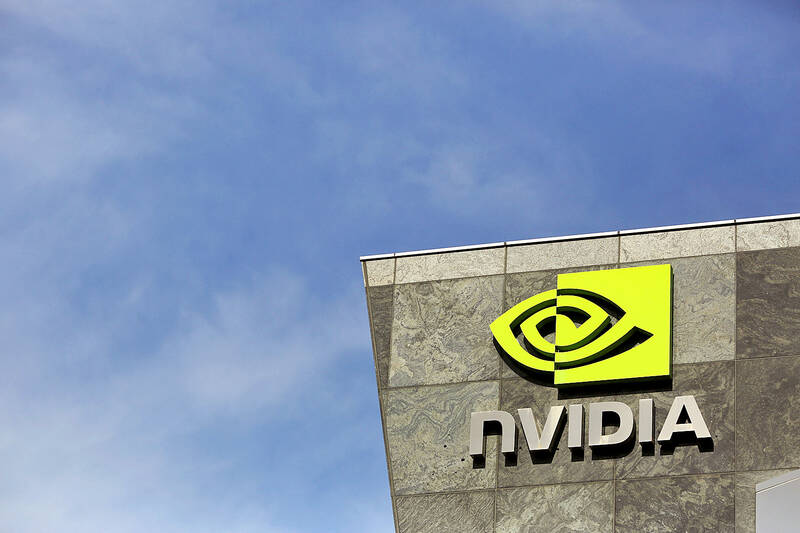Nvidia Corp dethroned Apple Inc as the world’s most valuable company on Friday following a record-setting rally in the stock, powered by insatiable demand for its specialized artificial intelligence (AI) chips.
Nvidia’s stock market value briefly touched US$3.53 trillion, slightly above Apple’s US$3.52 trillion, London Stock Exchange Group data showed.
Nvidia ended the day up 0.8 percent, with a market value of US$3.47 trillion, while Apple’s shares rose 0.4 percent, valuing the iPhone maker at US$3.52 trillion.

Photo: Reuters
In June, Nvidia briefly became the world’s most valuable company before it was overtaken by Microsoft Corp and Apple. The tech trio’s market capitalizations have been neck-and-neck for several months.
Microsoft’s market value stood at US$3.18 trillion, with its stock up 0.8 percent on Friday.
The Silicon Valley chipmaker is the dominant supplier of processors used in AI computing, and the company has become the biggest winner in a race between Microsoft, Alphabet Inc, Meta Platforms Inc and other heavyweights to dominate the emerging technology.
Known since the 1990s as a designer of processors for video games, Nvidia’s stock has risen about 18 percent so far this month, with a string of gains coming after OpenAI, the company behind ChatGPT, announced a funding round of US$6.6 billion.
Nvidia and other semiconductor stocks got a lift on Friday after data storage maker Western Digital Corp reported quarterly profit that beat analysts’ estimates, buoying optimism about data center demand.
“More companies are now embracing artificial intelligence in their everyday tasks and demand remains strong for Nvidia chips,” AJ Bell PLC investment director Russ Mould said.
“It is certainly in a sweet spot and so long as we avoid a big economic downturn in the United States, there is a feeling that companies will continue to invest heavily in AI capabilities, creating a healthy tailwind for Nvidia,” Mould said
Nvidia’s shares hit a record high on Tuesday, building on a rally from last week when Taiwan Semiconductor Manufacturing Co (台積電), the world’s largest contract chipmaker, posted a 54 percent jump in quarterly profit driven by soaring demand for chips used in AI.
Meanwhile, Apple is struggling with tepid demand for iPhone sales in China, which slipped 0.3 percent in the third quarter, while sales of phones made by rival Huawei Technologies Co (華為) surged 42 percent.
Shares of Nvidia have surged nearly 190 percent so far this year as the boom in generative AI led to a series of blowout forecasts from Nvidia.
“The question is whether the revenue stream will last for a long time and will be driven by the emotion of investors rather than by any ability to prove or disprove the thesis that AI is overdone,” Cherry Lane Investments LLC partner Rick Meckler said.
“I think Nvidia knows that near term, their numbers are likely to be quite remarkable,” he added.

MULTIFACETED: A task force has analyzed possible scenarios and created responses to assist domestic industries in dealing with US tariffs, the economics minister said The Executive Yuan is tomorrow to announce countermeasures to US President Donald Trump’s planned reciprocal tariffs, although the details of the plan would not be made public until Monday next week, Minister of Economic Affairs J.W. Kuo (郭智輝) said yesterday. The Cabinet established an economic and trade task force in November last year to deal with US trade and tariff related issues, Kuo told reporters outside the legislature in Taipei. The task force has been analyzing and evaluating all kinds of scenarios to identify suitable responses and determine how best to assist domestic industries in managing the effects of Trump’s tariffs, he

TIGHT-LIPPED: UMC said it had no merger plans at the moment, after Nikkei Asia reported that the firm and GlobalFoundries were considering restarting merger talks United Microelectronics Corp (UMC, 聯電), the world’s No. 4 contract chipmaker, yesterday launched a new US$5 billion 12-inch chip factory in Singapore as part of its latest effort to diversify its manufacturing footprint amid growing geopolitical risks. The new factory, adjacent to UMC’s existing Singapore fab in the Pasir Res Wafer Fab Park, is scheduled to enter volume production next year, utilizing mature 22-nanometer and 28-nanometer process technologies, UMC said in a statement. The company plans to invest US$5 billion during the first phase of the new fab, which would have an installed capacity of 30,000 12-inch wafers per month, it said. The

Taiwan’s official purchasing managers’ index (PMI) last month rose 0.2 percentage points to 54.2, in a second consecutive month of expansion, thanks to front-loading demand intended to avoid potential US tariff hikes, the Chung-Hua Institution for Economic Research (CIER, 中華經濟研究院) said yesterday. While short-term demand appeared robust, uncertainties rose due to US President Donald Trump’s unpredictable trade policy, CIER president Lien Hsien-ming (連賢明) told a news conference in Taipei. Taiwan’s economy this year would be characterized by high-level fluctuations and the volatility would be wilder than most expect, Lien said Demand for electronics, particularly semiconductors, continues to benefit from US technology giants’ effort

‘SWASTICAR’: Tesla CEO Elon Musk’s close association with Donald Trump has prompted opponents to brand him a ‘Nazi’ and resulted in a dramatic drop in sales Demonstrators descended on Tesla Inc dealerships across the US, and in Europe and Canada on Saturday to protest company chief Elon Musk, who has amassed extraordinary power as a top adviser to US President Donald Trump. Waving signs with messages such as “Musk is stealing our money” and “Reclaim our country,” the protests largely took place peacefully following fiery episodes of vandalism on Tesla vehicles, dealerships and other facilities in recent weeks that US officials have denounced as terrorism. Hundreds rallied on Saturday outside the Tesla dealership in Manhattan. Some blasted Musk, the world’s richest man, while others demanded the shuttering of his